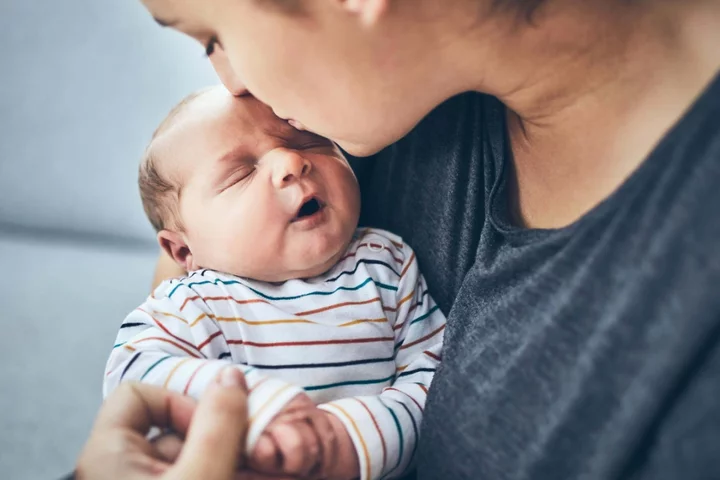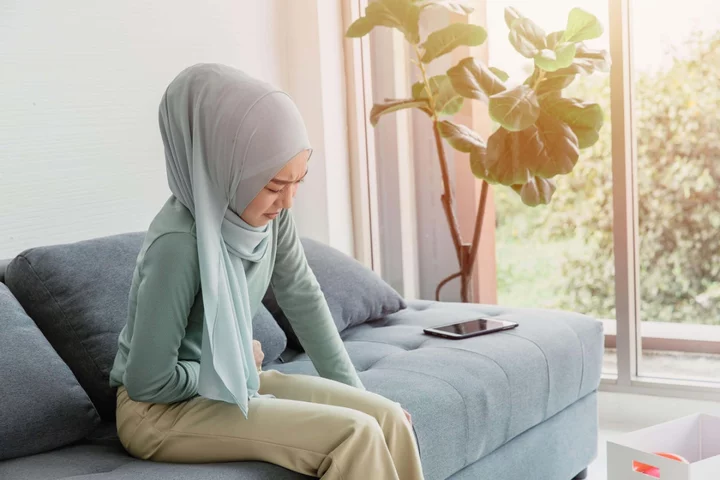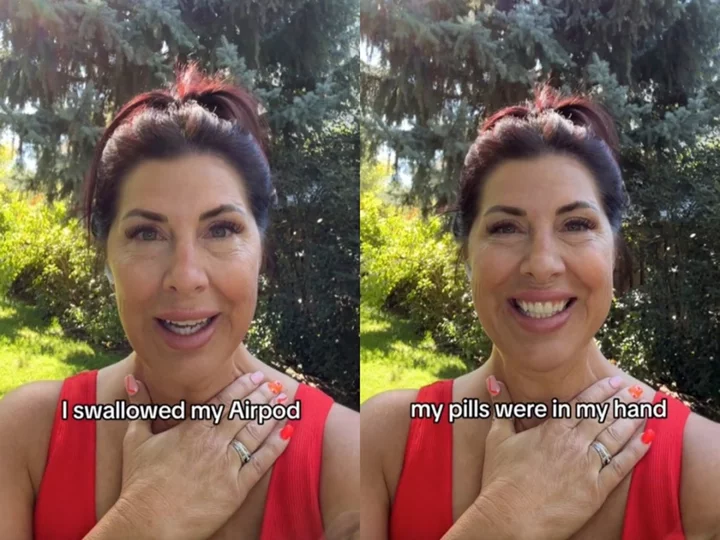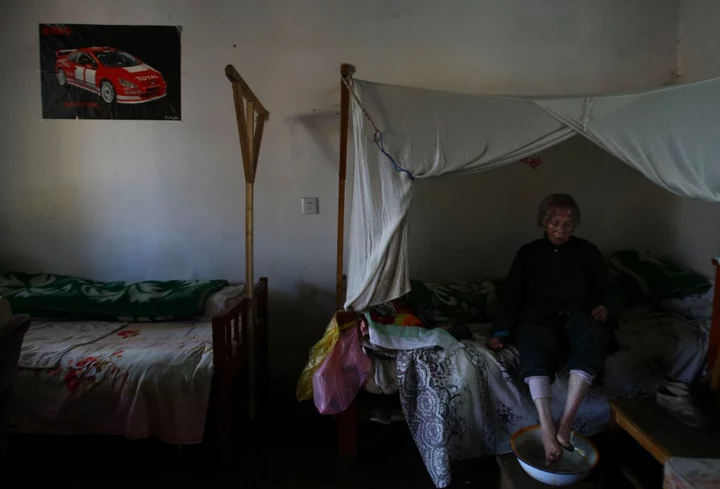
Action needed to protect women from birth trauma – MP
More must be done to protect women from birth trauma, a Tory MP has said after a new poll revealed that traumatic births have prevented a significant proportion of women from having more children. Theo Clarke said that it was “vitally important” that women receive the care and support they need after a traumatic birth. It comes after a poll of members of the Mumsnet community found that more than half (53%) who had suffered birth trauma said their experience put them off having more babies. The MP for Stafford has previously spoken out about her own birth story, where she described how she thought she was “going to die” after suffering a third degree tear and needing emergency surgery. She has since set up an All Party Parliamentary Group (APPG) on Birth Trauma to try to highlight the plight of thousands of women who suffer similar situations each year. A poll of 1,000 members of the Mumsnet website, shared with the PA news agency, found that 79% of those surveyed had experienced birth trauma. While the poll does not represent all mothers across the UK, it provides a snapshot of the experiences of those who use the popular parenting site. The survey also found that 72% of those who had experienced birth trauma said their issue had not been resolved a year after giving birth. Among those who had experienced physical, emotional or psychological birth trauma, 44% said healthcare professionals used language which implied they were “a failure or to blame” for the experience. Three quarters (76%) of all of those polled said they felt that health professionals had become “desensitised” to birth trauma. Almost two thirds (63%) said they did not believe healthcare workers did everything they could to prevent birth trauma. And 64% said they felt a “lack of compassion” from healthcare professionals during labour. Commenting on the poll, Ms Clarke said: “These survey results are deeply upsetting. They speak to my own experience of birth trauma and quite clearly to many, many other women’s horrendous experiences too. “That more than half of women across the UK who responded say they are less likely to want another child because of their birth experiences and they were made to feel they were to blame is simply terrible. “The survey is clear that more compassion, education and better after-care for mothers who suffer birth trauma are desperately needed if we are to see an improvement in mums’ physical wellbeing and mental health. “The APPG is now up and running in Parliament and will continue to listen to mothers and experts to drive fundamental change in how we treat mums. Our ambition is for birth trauma to be included in the Government’s women’s health strategy. “It is vitally important women receive the help and support they deserve.” Mumsnet chief executive Justine Roberts said: “We hear daily on Mumsnet from women who have had deeply upsetting experiences of maternity care, and this latest research underlines that the majority of mothers experience birth trauma – whether physical or psychological. “This trauma has long-lasting effects and it’s clear that women are being failed at every stage of the maternity care process – with too little information provided beforehand, a lack of compassion from staff during birth, and substandard postnatal care for mothers’ physical and mental health.” Kim Thomas, chief executive of the Birth Trauma Association, added: “It is time for a complete overhaul in the way women experience maternity. “This should include: honest, evidence-based antenatal education; compassionate and professional care during labour; and postnatal care that is designed to identify and treat every birth injury or mental health problem. “A maternity system that puts women at the heart of care is not some kind of unfeasibly high goal – it is the bare minimum that women have the right to expect.” A Department of Health and Social Care spokesperson said: “We are committed to making the NHS the safest place in the world to give birth, and improving support for women before, during and after pregnancy is a priority in the Women’s Health Strategy. “We are investing an additional £165 million per year to grow and support the maternity workforce and improve neonatal care. NHS England recently published a three-year plan to make maternity and neonatal care safer, more personalised, and more equitable for women, babies, and families. “To support women following trauma related to their maternity experience, we are rolling out 33 new maternal mental health services, which will be available across England by March 2024.” Read More Charity boss speaks out over ‘traumatic’ encounter with royal aide Ukraine war’s heaviest fight rages in east - follow live Imagination and hard work in children trumps obedience – research finds 7 ways you could be damaging your eye health without even realising Celebrities mingle with royals at glam Vogue World party in London
2023-09-15 16:27

What is the Baltimore Orioles magic number? Rays series means everything
With an important series against the Tampa Bay Rays on the docket, the Baltimore Orioles are on the precipice of winning the AL East and the No. 1 seed.
2023-09-15 09:25

Biden campaign plots long-game strategy as Democrats' fears of a Trump win spike
President Joe Biden's aides privately acknowledge a rematch with Donald Trump in 2024 could be his best path to reelection, but they are terrified by what would happen if he lost -- which operatives on his campaign and throughout the Democratic Party worry is a very real possibility.
2023-09-14 17:29

‘Millions of women and girls suffer severe pain’ during periods – research finds
Almost half of people who menstruate experience period pain that is ‘severe’ – and 51% feel their symptoms aren’t taken seriously by healthcare professionals, new research has found. The survey, commissioned by health charity Wellbeing of Women, asked 3,000 women and girls in the UK about their experience. A massive 86% of those surveyed said they have had mental health problems in relation to their period. Many said they had ‘debilitating pain’, bleeding for six weeks and some waited decades for a diagnosis of a health condition, in the survey of 16 to 40-year-olds across all regions, backgrounds and ethnicities. Women and girls have been “dismissed for far too long”, said Professor Dame Lesley Regan, chair of Wellbeing of Women. “It’s simply unacceptable that anyone is expected to suffer with period symptoms that disrupt their lives.” Painful, irregular and heavy periods can be symptomatic of serious gynaecological conditions. Signs of the chronic condition endometriosis – when the endometrial lining grows outside of the uterus – include debilitating period pain. Similarly, adenomyosis – a condition where the uterus lining starts growing into the muscle of the womb wall – is normally identifiable by painful periods and heavy bleeding. Painful periods may also be a sign of fibroids, non-cancerous growths that develop in or around the womb. Despite around two in three women developing at least one fibroid at some point in their life, according to the NHS, only 38% of those surveyed knew about the condition. Awareness for adenomyosis was even lower, at only 10%. The research found only 14% have tried medication to reduce heavy bleeding, despite treatments, like tranexamic acid which reduces blood loss significantly, being available. Caroline Nokes, Conservative MP and chair of the Women and Equalities Committee which is conducting an inquiry into reproductive and gynaecological health, said: “There is a terrible phrase, ‘Well, it’s just a period, why are you making a fuss about that? Can’t you just get on with it?’ “Yet many women and girls are experiencing horrendous period symptoms and gynaecological conditions. “These are impacting the health of women and girls, and preventing them from taking part in work, school, sport and everyday life. “Endometriosis alone affects 1.5 million women in the UK and costs the economy £8.2 billion – now is the time for change.” Wellbeing of Women have launched a new campaign called ‘Just A Period’ – aiming to address the normalisation of worrying period symptoms. NHS GP Dr Aziza Sesay said: “In my clinic, I see teenagers who are anaemic, who miss several days of school, and they don’t realise that this isn’t normal. They’ll literally use the words, ‘It’s just a period’. “It’s vital that we raise awareness and education on periods. We need to stop the narrative that heavy and painful periods are something we have to live with. “I want women and girls to have the knowledge to advocate for themselves, to push for more investigations, and to push for a diagnosis and treatment so that they don’t have to live with debilitating symptoms.” Clare Nasir, Channel 5 weather broadcaster and host of BBC Under the Weather broadcast, was diagnosed with fibroids and had an myomectomy – an operation to remove them. “With fibroids, there’s the physical pain but also the mental pain, I was struggling to conceive but looked about five months pregnant. People would write into the show asking why I hadn’t declared my pregnancy. It took a toll on my mental health. “When I eventually had my myomectomy, it was life changing. I’m passionate about raising awareness so that other women don’t feel alone and or suffer unnecessarily.” Read More Charity boss speaks out over ‘traumatic’ encounter with royal aide Ukraine war’s heaviest fight rages in east - follow live Cats given vegan diets ‘have better health outcomes’, study claims Groundbreaking migraine treatment offers ‘new hope’ for patients Taylor Swift and Shakira lead the charge in slit dresses at the 2023 MTV Video Music Awards
2023-09-14 13:16

Cardinals rumors: Jack Flaherty trade fell through, Willson Contreras safe, Waino on 200
It was been a rough season for the St. Louis Cardinals. Today's rumors slate involves a failed Jack Flaherty trade, Willson Contreras' future, and Waino on 200.
2023-09-14 04:28

Woman says she accidentally swallowed her AirPod after mistaking it for a vitamin
A woman has revealed that she accidentally swallowed her AirPod while distractedly talking to a friend because she mistook it for a vitamin. Tanna Barker, a 52-year-old realtor from Utah, went viral on TikTok when she shared the “embarassing” story of how she ate one of her AirPods. Now, many viewers have sent her advice as she waits for the wireless headphone to naturally pass. “Okay, I’m gonna be very vulnerable right now,” she began the video, which has been viewed more than 2.7m times since it was posted on Saturday 9 September. “I had a situation happen this morning that I’m still dealing with.” Barker explained that she was on her morning walk when she ran into her friend, Kathleen, who she hasn’t seen in quite some time. “She was filling me in on her life and it’s been very, very busy and full and a lot went on, actually,” she said. However, Barker couldn’t hold back her laughter as she recounted: “Halfway through my walk, I decided to take my vitamins. So I put my vitamins in, took a drink and I was like: ‘Man, those are stuck.’” She then “guzzled” her water to wash the vitamin down, said goodbye to her friend, and kept going on her walk. But when she went to reach for one of her AirPods, she realised it was nowhere it be found. “My pills were in my hand. I swallowed my AirPod,” Barker said, laughing. Much like anyone would do in Barker’s situation, she quickly called friends and professionals in the medical field who “all suggested the same thing” - to let the AirPod pass naturally. “I don’t know if anyone has ever done that, it’s embarrassing, but I did it and we’ll see what happens. I’m gonna follow the advice of professionals,” she added. Despite swallowing her one AirPod, Barker pointed out that there’s still a “bonus” to the unfortunate situation: “I still have my right AirPod.” @tannasellsutah ?OH MY GOOOOOOOSH!!!! You have to watch this! So embarrassing!!! #istillcantbelieveit #whatinthelivingheck #thistooshallpass #whatthe #iamshook #getoutofmybelly ♬ original sound - IamNanaTanna She captioned her TikTok video with the hashtags: #istillcantbelieveit, #whatinthelivingheck, #thistooshallpass, #whatthe, #iamshook, and #getoutofmybelly. Barker’s viral video has since received thousands of comments from TikTok users, a majority of them mostly curious whether the AirPod was still working inside Barker’s body and if she can hear music from her stomach. “The first thing I’d do is play music and see if I can hear it from my stomach,” one person commented. “Play music really loud so you can track its progress,” another user joked. “I’d literally have a panic attack knowing an AirPod is in me,” said someone else. “Not knowing what will happen, possibly blowing up.” @tannasellsutah Part 2…take 2…#2 ♬ original sound - IamNanaTanna In a follow-up video, Barker revealed that it was actually her husband’s AirPod that she swallowed, but he’s maintained a positive outlook on the situation. She recently told her husband that she was going grocery shopping and he asked how long she’ll be out, before telling Barker: “Oh, never mind. I could track you.” Many Apple users are aware that wireless AirPods are able to be tracked on the iPhone’s Find My Devices feature. When one TikToker asked Barker if she’s tried locating the AirPod with the tracking device to see if it still worked, she revealed that the app signaled her AirPods were in her stomach. “We did ‘Find My’ AirPod yesterday and it worked! Today, I think the battery is dead,” Barker replied. Speaking to Insider, Barker explained that she was told by medical professionals to let it pass naturally, and that it shouldn’t cause any harm because the battery is encased in the AirPod. @tannasellsutah PTAS - Post Traumatic AirPod Stress #ptas #thistooshallpass #shareyourshine #findhumorinlife #iammworthy #airpodsareforears #whatinthelivingheck #getoutofmybelly ♬ original sound - IamNanaTanna “One of them asked if I had swallowed both [AirPods] and I said no. And he said: ‘Well, that’s good because it has the magnet in it and that could have caused an issue,’” she told the outlet. Another doctor suggested that she go to the emergency room if she runs a fever, or her “stomach gets hard” and she’s nauseous. “I just have to find humour in my life,” Barker told Insider. “And so that’s kind of a default, thank goodness.” The saga finally came to a close when Barker updated her followers on her recent bowel movements. “When I first posted my post, one of the hashtags was #ThisTooShallPass… and it has,” she said in a video posted on Monday. @tannasellsutah ?Take✌?with Tanna‼️? Wait for it… #thistooshallpass #take2withtanna #iammworthy #shareyourshine #findhumorinlife #airpodsareforears #whatinthelivingheck #ipood #yoursoulisbeautiful #selffull #youarebright ♬ original sound - IamNanaTanna Barker also patted herself on the back for maintaining a positive attitude about the AirPod debacle, and thanked her newfound fans for joining her on the ride. “Oh my goodness, it has been such an amazing experience and such a wild ride, and I am so grateful that I have been able to protect my mindset,” she continued. “When things like this happen in my life - and this has been the most extreme for sure - but I have had experiences in my life where I’ve been able to have my mindset protected, and that I’ve been able to look at it with positivity and lightness. So I hope that I can continue to do that for you guys.” The Independent has contacted Barker for comment. Read More Plane passenger calls out father for leaving his wife with children while he has ‘kid-free flight’ Single woman’s day in a life video met with vitriol after going viral Woman’s ‘terrifying’ NYC apartment tour shocks the internet Schoolboy almost dies from swallowing magnets for TikTok challenge Woman shares honest review of New York City apartment TikTok mom slammed after making 5-year-old son run in 104 degree heat
2023-09-14 02:54

Supercomputer predicts Man City's biggest challengers in 2023/24 Champions League
The leading contenders for Manchester City's Champions League crown, according to Opta.
2023-09-14 00:18

‘It can be hard when your kids leave the nest,’ mother says as study finds parents want their children back
Two-thirds of parents whose children have left home would gladly have them back again. A study with 2,000 mums and dads whose children have left said they would like their children to live no further than 14 miles away from them on average. But 90 per cent were keen to support their child’s dream and let them have their own adventure. As a result, 53 per cent travelled with them for their moving-in day, and 15 per cent stayed in a hotel to ensure they were settled. For 14 per cent of those, this stay ended up being as long as a week to ensure their child was okay. The research was commissioned by Premier Inn, which has created a downloadable ‘Empty Resters’ guide in partnership with content creator and parent, Tracey Lea Sayer, aged 51, to help parents through this change. She said: “It can be hard when your kids leave the nest. “Driving them up to university for the first time, for example, is the last big thing parents get to do for them before they become an adult. ”Our tips cover lots of the issues parents will face when helping kids leave the nest. “From packing advice to making sure kids have essential life skills like how to use a washing machine or plan a food shop, it’s all here. “Helping to focus on practical matters can be really beneficial for parents who might feel overwhelmed with emotion – and it can also really help them feel useful to their kids.” The study also revealed 36 per cent proceeded to redecorate their child’s bedroom after they’d shipped out. But 28 per cent of these simply spruced up the room, making it more comfortable, for when they come back for the holidays. It also emerged kids are slightly more likely to move out and stay local than move a good distance away (57 per cent compared to 41 per cent). And 29 per cent of parents find their children come home weekly. Most kids moved away for university (32 per cent), but 29 per cent moved in with a partner and 10 per cent got their own place with friends. But while 65 per cent would be happy to have their kids move back in with them if needed, 45 per cent said their relationship with their child has improved since they left. However, kids shouldn’t expect a free ride – as 55 per cent of the parents polled, via OnePoll, would be expecting some cash in rent every month. And their child moving out has led to 28 per cent travelling more, 26 per cent having more disposable income and 23 per cent eating out more. ‘A new chapter in her life’ Tracey said her eldest daughter Franke left to go to University last year and said one thing that brought them closer was “preparing her for her university life,” which helped them “bond over the little things that signified a new chapter in her life.” Tracey added: “From the obligatory shopping trip for essential bits and bobs, to teaching her how to make the perfect scrambled eggs and navigate laundry instructions. “Buying essentials in advance made us both feel more prepared, it meant Frankie and I could spend some quality time together too. “Equipped with a checklist of essentials well in advance, the daunting moving-in date had arrived. “Having already familiarised myself with the layout of the city, the location of her accommodation and the proximity of nearby hotels for visits during term time, I found a certain sense of comfort when we arrived in her university city, which is a fair distance from home. “Learning these in advance put my mind to ease and made the moving process a lot smoother.” Here are some top tips from Tracey for parents who are finding it hard after their children moved away: 1. Spend quality time with your other kids: When Frankie left for university, I got to spend real quality time with my younger son. He is quieter and doesn’t need as much attention but now he has me all to himself. 2. Create a New Routine: Establish a new daily routine that fits with your new schedule. Don’t think you will have loads more free time though. The admin that comes with having a child at Uni is relentless. Your ‘To do’ list won’t get any shorter. Student housing, finance and travel all need organising. 3. Focus on Self-Care: Prioritise you for once. Your physical and emotional well-being is important. Try to exercise, eat well and de-stress. 4. Connect with Other Parents: Sharing your experiences can be hugely comforting. I chat to the ladies at my exercise class who are all going through the same thing. We share notes, get it all off our chests and have a right good laugh about all the things the kids are getting up to. 5. Embrace the three Stages: Grief, relief and joy. Of course, you are going to be sad and grieve when your child leaves home, but you will get used to it and weirdly quite quickly. There is a sense of relief once they have settled in and made new friends. It took about three months for it to not feel strange just coming home to the boys Read More Schoolgirls struggle to access basic period protection, research suggests Cost of living means parents have less time to play with children, according to poll When is Freshers’ Week 2023 and how can I make the most of it? Meghan Markle gives children a shoutout as she joins Prince Harry at Invictus Games How many children does Elon Musk have? Single woman’s day in a life video is met with vitriol after going viral
2023-09-13 22:47

Biden campaign corrals high dollar donors as reelection effort begins to rev up
President Joe Biden's campaign is assembling top donors in Chicago this week with questions looming about how the campaign's high dollar and grassroots donor operations will fare as a key fundraising deadline approaches at month's end.
2023-09-13 17:23

Manchester United vs Bayern Munich: Complete H2H record
A complete rundown of Man Utd's head-to-head record against Bayern Munich.
2023-09-13 16:50

John Mayer to play charity gig to raise money for veterans
John Mayer has announced he will be playing a one-off show in Los Angeles next week to raise funds for a veterans charity
2023-09-13 15:26

Sitting this many hours a day ‘rapidly increases’ dementia risk, study warns
Adults who spend a large part of their day engaging in sedentary behaviors are more prone to dementia, a new study finds. The research, published on Monday in the journal JAMA, found that people aged 60 and older who spend over 10 hours a day engaging in behaviors like sitting while watching TV or driving could be at increased risk of developing dementia. Scientists, including those from the University of Southern California say, the findings are concerning since Americans on average are sedentary for about 9.5 hours each day. In the study, researchers assessed the data from about 50,000 adults over the age of 60 who had wrist-worn accelerometers to measure their movement for 24 hours per day for a week. The individuals did not have a diagnosis of dementia at the start of the study, scientists noted. They then used a machine-learning algorithm to analyse the dataset of accelerometer readings and classify behaviors based on different intensities of physical activity. Using the AI system, scientists could differentiate between different types of activity and sleeping – providing an objective measure of the time each person spent engaging in different types of sedentary behaviors. After an average of six years of follow-up, researchers used hospital records and death registry data to determine dementia diagnosis, and found 414 participants had the neurological condition. Scientists then adjusted for factors such as age, sex, education level, race/ethnicity, chronic conditions, genetics as well as lifestyle characteristics like physical activity, diet, smoking and alcohol use, self-reported mental health. They found that sedentary behavior was linked with increased risk of dementia among the participants. However, they found that certain amounts of sedentary behavior was not associated with dementia. “We were surprised to find that the risk of dementia begins to rapidly increase after 10 hours spent sedentary each day, regardless of how the sedentary time was accumulated,” study author Gene Alexander from the University of Arizona said. “This suggests that it is the total time spent sedentary that drove the relationship between sedentary behavior and dementia risk, but importantly lower levels of sedentary behavior, up to around 10 hours, were not associated with increased risk,” Dr Alexander added. Researchers call for more studies to establish causality and whether physical activity can mitigate the risk of developing dementia. The findings, according to scientists, “should provide some reassurance to those of us with office jobs that involve prolonged periods of sitting, as long as we limit our total daily time spent sedentary”. Read More What it’s like having Menopause Brain in a millennial office Josh Duhamel and wife Audra Mari announce they’re expecting first baby together Woman warns not to ignore symptoms after hot flushes lead to leukaemia diagnosis Poor metabolic health ‘linked with 12% higher risk of dementia later in life’ Sleeping pill could reduce levels of Alzheimer’s proteins Daily aspirin dose can help prevent diabetes in older people, scientists say
2023-09-13 15:17
